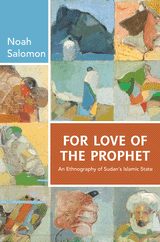For Love of the Prophet argues that in moving beyond the institutional life of the Sudanese state, we are able…
For Love of the Prophet

Noah Salomon’s recent ethnography of the Islamic state in Sudan looks at this political formation as it is lived out in daily life. As Salomon phrases it in his introduction to the series,
“As much a meditation on the religious dimensions of the modern state in general as it is an ethnography of religious and political life in Sudan, For Love of the Prophet asks readers to question their own assumptions about what has sustained foundational politics in our ‘post-foundational age.’ Moving beyond arguments about the impossibility of the Islamic state as a moral-theoretical or an ethical-political project, For Love of the Prophet draws on ethnographic research to ask by what means the Islamic state does in fact proceed in spite of its seeming contradictions.”
In this series, six scholars from an array of disciplines discuss Salomon’s contribution to conversations on state formation, the Islamic in the public, and the history of Sudan. They ask questions based on their own research interests, engaging with the text from a variety of perspectives.
Begin with reading Noah Salomon’s introduction here. Follow along with the conversation with the responses below.
New itineraries in the study of Islam and the state
From Wael Hallaq’s The Impossible State to Shahab Ahmad’s What is Islam?, recent scholarship on Islam and the state has…
When is the Islamic state? Historical time and the agenda of Islamic studies
From the Islamic revolutions in Iran (1978-79) and Sudan (1989) to the recent emergence of ISIS, the concept of an…
The rhetoric of Islamic politics in local and global dimensions
Noah Salomon’s ethnography of politics provides a penetrating insight on the far-reaching effects of the Islamic state project in the…
Tainted love
Noah Salomon begins his work with the provocative statement that the “state may have failed according to the criteria of…
Taking the Islamic in “the Islamic state” seriously
I want to focus on Salomon’s argument that the secular state—in this case the British colonial one—is in the business…
The inevitable Islamic State? The paradoxes of Sudanese politics and society
Noah Salomon’s recent book, For Love of the Prophet, is a lesson in academic creativity in the face of adversity.…
For Love of the Prophet—A reply
For Love of the Prophet certainly is a book about Sudan, but, like all ethnographies, it is also very much…












